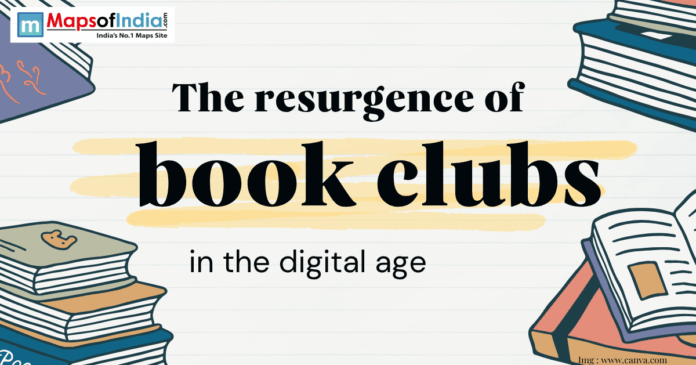The culture of book clubs has been around for centuries among book lovers. This club started as small gatherings of people who came together to discuss literature, exchange ideas about these works, and build communities with like-minded individuals. In recent years, the book scenario across the world has seen a surge, and with that, the book clubs have witnessed a powerful resurgence in this culture. What was once confined to living rooms and libraries has now expanded into a global reading network which connects the reading community online. The rise of the digital age has transformed the way book clubs function across the world. Making these clubs more accessible, diverse, and influential than they ever were before.
The Evolution of Book Clubs
The known traditional book club culture involved meeting physically in a place where readers would gather to share thoughts about their chosen book. The format of these clubs is usually informal. The members of these clubs over the period of time will develop strong social bonds. With the arrival of the internet, book clubs are now happening mostly online. Social media groups, virtual meetings with members, and reading apps have created new ways for readers to be connected with each other. This evolution in the reading book culture has expanded the reach of book clubs. Expanding their culture beyond geographic boundaries.
Accessibility and Inclusivity
The rise of the digital age has made book clubs accessible to almost anyone who is interested. Like previous times, people do not need to live in the same neighbourhood or city to participate in any club. These online book clubs use various means to stay connected, like video calls, group chats, and forums. This way, they engage readers from across the globe in these clubs. This inclusivity of different people allows people of different backgrounds, cultures, and time zones to join in the conversation. Digital access is also helping those who are facing some physical barriers, like those who have mobility issues, and are not able to actively participate.
Diversity of Choices
The rise of digital book clubs gives a wider variety of reading choices to book lovers. In the traditional book clubs, they were often focused on classic literature or popular bestseller books. Most of the time, the one who started the club will choose the book. But these online platforms make it possible for the readers to choose from whichever niche genres club they want to join. In these clubs, you can get connected with book lovers across the world. Nowadays, readers from various parts of the world can find groups that can match their interests.
The Role of Social Media
Social media is an important aspect in reviving book club culture across various continents in the world. On Social media platforms like Instagram, Facebook, and TikTok, people have created communities that are seriously dedicated to books. Various pages or groups on social media platforms are bringing millions of like-minded people together in the form of a book club. Influencers and authors use these online platforms to recommend connecting with their readers. Social media adds a visual and interactive layer to this book club culture, making it attractive to this younger generation.
Impact on Publishing
The resurge of book clubs in recent years has made a significant impact on the book publishing industry. In many cases, we can see that a book chosen by a popular book club can see dramatic increases in its sales. Now, various book publishing companies view book clubs as powerful marketing tools. Authors also get greater exposure to the audience and can form a direct engagement with readers through these book clubs. Book clubs create buzz around a book and sustain long-term interest in that book, which might otherwise fade away quickly. This symbiotic bond, which is formed between readers and publishers, is making the overall literary ecosystem strong.
Building Communities
One of the strongest things that can be complimented about these book clubs is their ability to form a strong community bond. In this rising digital era, the online communities have now formed a strong bond that extends beyond the borders of the nation. Readers connect with the communities not only to discuss books but also in these clubs they share life experiences, cultural perspectives, and personal stories. Many of the participants in these clubs value the friendships and support networks they formed within these groups. These digital book clubs help many readers to fight against isolation and develop a sense of belonging.
Educational Benefits
The Book clubs can give educational value through both traditional and digital forms. The discussion in the book club encourages readers to think critically, make us listen actively, and develop interpretation skills among the readers. Readers through these clubs are being exposed to ideas and contexts that they might not have known. In the online book clubs, additional resources such as interviews with the author, podcasts about the book, and academic articles can be easily shared among the group, which deepens the people’s understanding of an issue. For younger participants in these clubs, digital book clubs often work as informal learning spaces that promote the habit of reading.
Challenges in the Digital Space
Book clubs give many advantages to people, but despite having so many advantages, digital book clubs face various kinds of challenges. There were various challenges faced by this club. There are many challenges, like having a poor internet connection or a lack of familiarity with digital tools needed to have an online meeting, which way some people who like to read bit does not have access are excluded from participating. Online discussions among the club members also lack the intimacy and warmth that can be seen in face-to-face meetings. Another challenge is online meeting is maintaining commitment. In many cases, members of the club may drop out more easily when the meetings are happening virtually. Ensuring inclusivity and engagement requires thoughtful planning and moderation.
Final Thoughts
The culture of book clubs is becoming mainstream again. This reinvention is happening because of the rise of the digital age. This digital book club brings together readers from different corners of the world. Giving voice to different backgrounds and shaping publishing trends. These online book clubs are about community building, having proper dialogue with members, and the shared joy of stories. As technology continues to evolve, and with that, the resurgence of book clubs will always have us believe that reading will always be a collective experience, whether in person or online.





